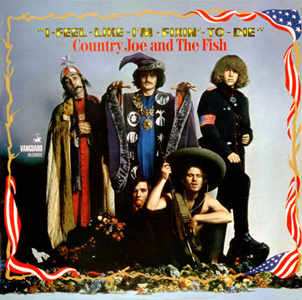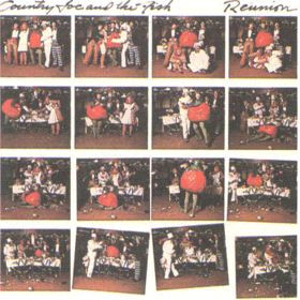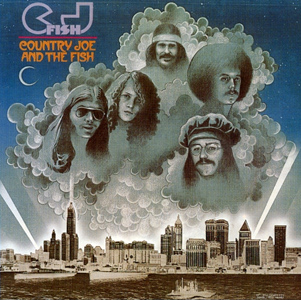
Country Joe and the Fish was an American psychedelic rock band formed in Berkeley, California, in 1965. The band was among the influential groups in the San Francisco music scene during the mid- to late 1960s. Much of the band's music was written by founding members Country Joe McDonald and Barry "The Fish" Melton, with lyrics pointedly addressing issues of importance to the counterculture, such as anti-war protests, free love, and recreational drug use. Through a combination of psychedelia and electronic music, the band's sound was marked by innovative guitar melodies and distorted organ-driven instrumentals which were significant to the development of acid rock.

Joseph Allen "Country Joe" McDonald is an American singer, songwriter and musician who was the lead vocalist of the 1960s psychedelic rock group Country Joe and the Fish.

"Time" is a song by English rock band Pink Floyd. It is included as the fourth track on their eighth album The Dark Side of the Moon (1973) and was released as a single in the United States. With lyrics written by bassist Roger Waters, guitarist David Gilmour shares lead vocals with keyboardist Richard Wright.

Her Wallpaper Reverie is the third album from The Apples in Stereo.

The Discovery of a World Inside the Moone (2000) is the fourth album from The Apples in Stereo. It received generally good reviews as a showcase for the band's experimental/psychedelic pop.

"Don't Walk Away" is a song by the Electric Light Orchestra (ELO).

I-Feel-Like-I'm-Fixin'-to-Die is the second studio album by the influential San Francisco psychedelic rock band, Country Joe and the Fish, released at the end of 1967.

Third Rock from the Sun is the fourth studio album by American country music artist Joe Diffie. Diffie's breakthrough album, the first five tracks were all released as singles, and all charted on the Billboard Hot Country Singles & Tracks charts. Of these five singles, "Pickup Man" and the title track were both Number One hits, "So Help Me Girl" reached #2, "I'm in Love with a Capital 'U'" reached #21, and "That Road Not Taken" peaked at #40. "Pickup Man" was also Diffie's longest-lasting number one, having held that position for four weeks.

"I-Feel-Like-I'm-Fixin'-to-Die Rag" is a song by the American psychedelic rock band Country Joe and the Fish, written by Country Joe McDonald, and first released as the opening track on the extended play Rag Baby Talking Issue No. 1, in October 1965. "I-Feel-Like-I'm-Fixin'-to-Die Rag"'s dark humor and satire made it one of the most recognized protest songs against the Vietnam War. Critics cite the composition as a classic of the counterculture era.

David Bennett Cohen is an American musician best known as the original keyboardist and one of the guitar players for the late-1960s psychedelic rock and blues band Country Joe and the Fish.

Thinking of Woody Guthrie was released in 1969 by Vanguard Records and is the debut solo album of Country Joe McDonald, best known for his work with Country Joe & the Fish. It was a different approach by McDonald to release a folk music and country album in the style of Woody Guthrie. Prior to this solo release, he was known to make albums in a psychedelic style with his band. The album was a tribute to the work of Woody Guthrie, a country and folk musician who died two years earlier. All of the tracks on the album were either composed or performed by Guthrie. McDonald was heavily influenced by Guthrie since he was a child. McDonald could recall his interest of Guthrie came first when his parents played Guthrie's first album, Dust Bowl Ballads. Even though McDonald has issued several albums in his career, he looks to this album as the piece he is most proud of.

Together is the third album by the San Francisco psychedelic rock band Country Joe and the Fish, released in 1968. Country Joe McDonald had briefly left the band prior to the recording sessions. All of the band members contributed to the songwriting. Together is the most commercially successful album from the band.

Reunion is the sixth studio album by the American psychedelic rock group Country Joe and the Fish, released in 1977. It constituted a reunion of the members of the 1967 band. It was produced by Sam Charters for Fantasy Records and recorded between January and April 1977. The music is not as psychedelic, and several tracks are country rock.

For the Kids is the second Extended Play by American country music artist John Rich, one half of the duo Big & Rich. Rich contributed to the writing of three of the six total tracks. The EP was released on May 17, 2011, coinciding with the release of John Rich's other EP, Rich Rocks. Reprise Records released both For the Kids and Rich Rocks. The songs "She's a Butterfly" and "Rescue Me" were originally recorded by Rich for his 2001 solo album Rescue Me.

CJ Fish is the fifth album by the San Francisco psychedelic rock group, Country Joe and the Fish, released in May 1970 on the Vanguard label. It would be the first production with Tom Wilson and Country Joe & the Fish's last studio album for Vanguard Records. Recording took place at the Record Plant in Los Angeles, California.

Elizabeth was an American psychedelic rock/progressive rock band that were active from 1967 to 1970. They were based out of Philadelphia and known for their unique musical and sonic blend of baroque, classical, folk, American rock, British rock, country, and ragtime. Elizabeth's members were: Steve Weingarten, who died in 2007; Bob Patterson ; Jim Dahme ; Steve Paul Bruno ; and, Hank Ransome (drums).

Here We Are Again is the fourth album by the psychedelic rock band Country Joe and the Fish. It was released in 1969 with the US catalog number Vanguard VSD 79299. It peaked on the Billboard 200 at number 48, and stayed on the charts for eleven weeks. Only "Country Joe" McDonald and Barry "The Fish" Melton remained from the original lineup, which had begun breaking up since the previous album. The past members would appear as guest musicians though. The songs were composed by McDonald and Melton.

The Life and Times of Country Joe and the Fish is a compilation album by the American psychedelic rock band Country Joe and the Fish and was released on Vanguard Records in September 1971. The album provides a summary of Country Joe and the Fish's history from their formation in 1965 to their disbandment in 1970, and also serves as a survey of their recording career during that span. Although the track listing is not in a specified chronological order, it does encompass a mixture of their most celebrated experimental and traditionally-structured compositions. All of the songs included on the original The Life and Times of Country Joe and the Fish album can all be found on the band's first five albums, Electric Music for the Mind and Body, I-Feel-Like-I'm-Fixin'-to-Die, Together, Here We Are Again, and CJ Fish.

I Could Use Another You is the fifth studio album by American country music singer Eddy Raven. It was released by RCA Nashville in June 1984. The album contains the singles "I Got Mexico", "I Could Use Another You", and "She's Gonna Win Your Heart".

Mixtape, Vol. 1 is the third extended play (EP) by American country music singer Kane Brown. The seven-song EP was released on August 14, 2020, as his second EP with the Sony Music Nashville label, with the first Sony EP being Chapter 1. He had earlier released an independent EP on his own label, titled Closer.




















